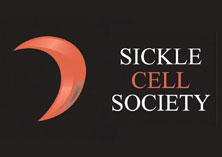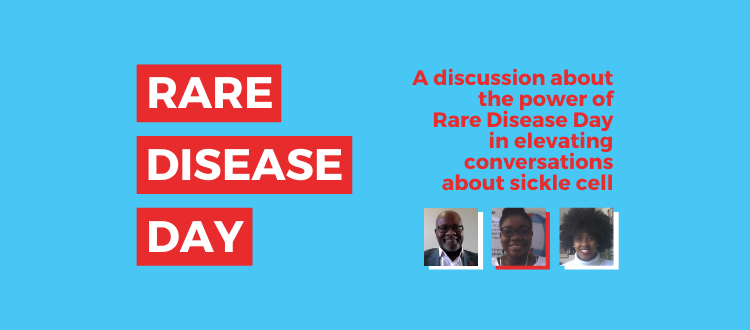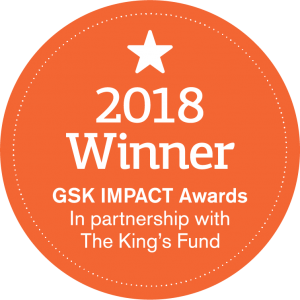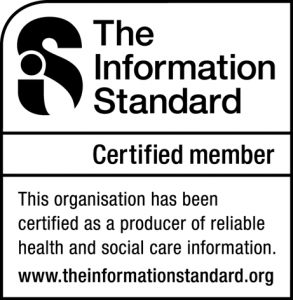Rare Disease Day
Sickle Cell Society Joins Discussion with GBT about the Power of Rare Disease Day in Elevating Conversations about Sickle Cell
“Rare Disease Day is so important because it helps to raise global awareness of SCD, which translates into eliminating geographical inequalities, stigma and barriers to treatment.” – Mary Ampomah, President and CEO, Global Alliance of Sickle Cell Disease Organizations (GASCDO)

More than 300 million people worldwide live with a rare disease. Rare Disease Day, which takes place on February 28 each year, presents an opportunity to hear from patients about the impact of living with a rare disease. It’s a chance to celebrate the triumphs of the advocacy community in raising awareness and helping to advance patients’ health and well-being.
This year, in honor of Rare Disease Day, Global Blood Therapeutics convened a virtual panel of sickle cell disease advocates from around the world.
Our Chief Executive, John James OBE, was thrilled to be invited to join Mary Ampomah (President and CEO, Global Alliance of Sickle Cell Disease Organizations) and Ashley Valentine (Co-Founder, Sick Cells) in a thoughtful and stimulating discussion that touched on global awareness efforts, equity in SCD care and the importance of recognizing Rare Disease Day around the globe.
For John James OBE, CEO of the Sickle Cell Society, Rare Disease Day presents a unique opportunity to put SCD patients – as well as the caregivers and medical workers who champion their health – in the spotlight. Sickle cell disease, he says, has never been given the attention it deserves.
“There is a deep history of health inequity and racial discrimination within sickle cell disease that we’re just beginning to reckon with,” said John. “Covid has really illuminated these hard truths, and a lot of what we’re doing now around vaccine uptake is trying to build that trust and allay the concerns of people who are justifiably wary of the medical system.”
But the tide has begun to turn. Sickle cell disease education efforts in Britain and across the world have improved understanding of the disease, and major advancements in SCD care have made a world of difference in the day-to-day lives of patients.
“Seeing GBT and other industry members so involved with sickle cell advocacy reassures us that medical innovation and drug development really is happening,” said John. “It lifts up the voices of community organizations and signals that we’re partners with a shared goal of improving patients’ lives.”
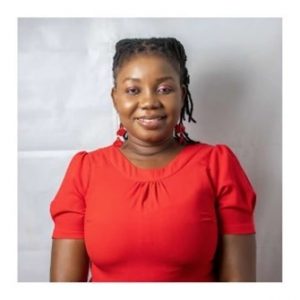 To Mary Ampomah, Rare Disease Day offers an opportunity to appreciate the mental toughness and resilience of SCD patients around the world. As the acting president and CEO of the Global Alliance of Sickle Cell Disease Organizations (GASCDO), Mary now guides an international network of community-based organizations as they work to serve millions of SCD patients and their families around the world. She sees it as the perfect forum to apply her vast experience research and teaching experience to the broader SCD community.
To Mary Ampomah, Rare Disease Day offers an opportunity to appreciate the mental toughness and resilience of SCD patients around the world. As the acting president and CEO of the Global Alliance of Sickle Cell Disease Organizations (GASCDO), Mary now guides an international network of community-based organizations as they work to serve millions of SCD patients and their families around the world. She sees it as the perfect forum to apply her vast experience research and teaching experience to the broader SCD community.
“The best part of advocating for patients and working with them is seeing them go from feeling hopeless to smiling back to the world when they receive support and adequate care,” said Mary.
 Ashley Valentine knows a thing or two about the unwavering strength of SCD patients. Along with her brother Marqus, who was born with SCD, Ashley founded Sick Cells. At birth, Marqus was given a life expectancy of just 10 years. He shattered those predications, persevering through constant pain and other struggles and becoming a beacon of light and a genuine friend to so many SCD patients enduring similar struggles. The community was extremely saddened by the news of Marqus’ passing last year, however Ashley continues to advocate tirelessly for others living with SCD in honor of Marqus’ memory.
Ashley Valentine knows a thing or two about the unwavering strength of SCD patients. Along with her brother Marqus, who was born with SCD, Ashley founded Sick Cells. At birth, Marqus was given a life expectancy of just 10 years. He shattered those predications, persevering through constant pain and other struggles and becoming a beacon of light and a genuine friend to so many SCD patients enduring similar struggles. The community was extremely saddened by the news of Marqus’ passing last year, however Ashley continues to advocate tirelessly for others living with SCD in honor of Marqus’ memory.
Ashley’s work is primarily focused on the SCD landscape in the U.S., however, many of the obstacles that American patients face are mirrored around the world. Access to care, provider education and the transition from pediatric to adult care are salient topics that affect SCD patients regardless of nationality.
“Continuing conversations across borders of all kinds allows all SCD stakeholders to make global change, see patterns, evaluate best practices, and avoid repeated mistakes,” said Ashley. “The SCD community as a whole will make the most progress if we maintain an open, transparent, and honest dialogue.”
